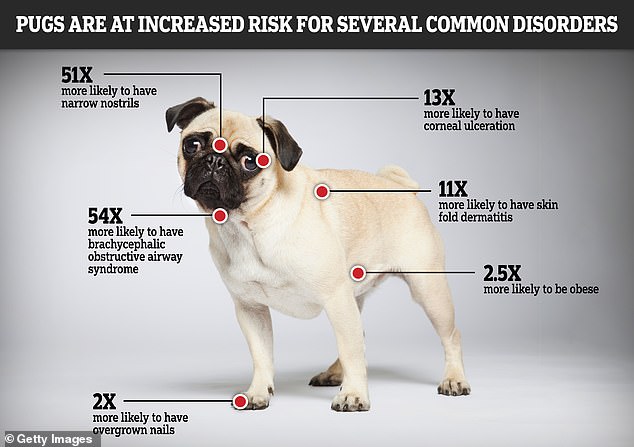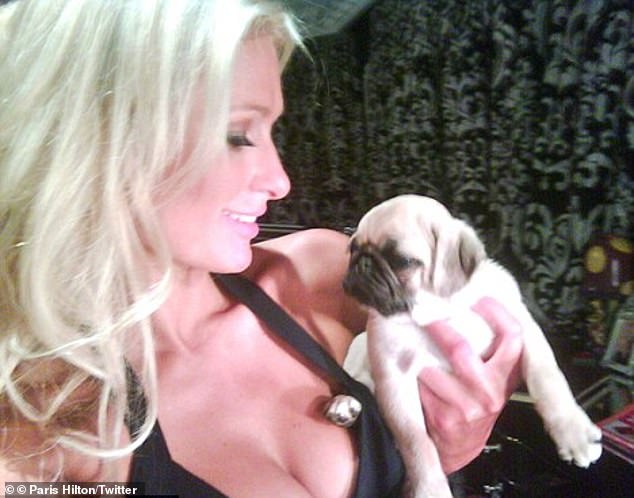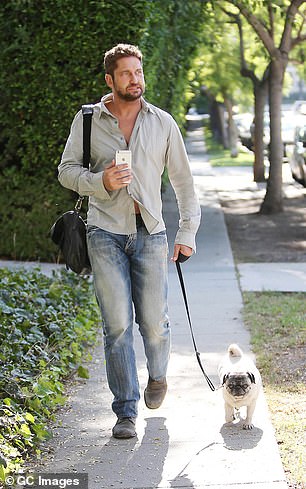Yet ANOTHER reason not to buy a pug: Vets warn flat-faced dogs are more likely to suffer from sleep problems
- Researchers found that flat-faced dogs retain sleep patterns from puppyhood
- They suggest that the selection of baby-like characteristics has also infantilized brain function
With their squished little noses and curled tails, pugs have become a favorite among dog lovers and celebrities.
Gerard Butler, Paris Hilton and Zoe Sugg are just some of the famous faces who have shared their lives with the breed.
But vets are urging people not to buy pugs as new research shows flat-faced dogs are more likely to suffer from sleep problems.
Researchers from Eotvos Lorand University in Budapest found that flat-faced (or brachycephalic) dogs retain sleep patterns from puppyhood.
“It is possible that the selection of dogs to look like a baby has also infantilized their brain function,” said Professor Eniko Kubinyi, lead author of the study.
Vets are urging people not to buy pugs as new research shows flat-faced dogs are more likely to suffer from sleep problems

The characteristics of flat-faced dogs did not evolve naturally, but are instead the result of selective breeding. This facial structure puts them at high risk for a range of health problems, including skinfold dermatitis, breathing and eye problems
The characteristics of flat-faced dogs did not evolve naturally, but are instead the result of selective breeding.
This facial structure puts them at high risk for a range of health problems, including skinfold dermatitis, breathing and eye problems.
In their new study, the team wanted to investigate whether their short faces also affect their sleep cycles.
“We wanted to investigate whether dogs with a flat face sleep differently than other dogs, because they are known to suffer from oxygen deprivation due to breathing problems and therefore have poorer sleep quality,” explains researcher Zsófia Bogná.
The team recruited 92 dogs, who were brought to the laboratory with their owners.

With their squashed noses and curled tails, pugs have become a favorite among dog lovers and celebrities like Paris Hilton


Gerard Butler, Paris Hilton and Zoe Sugg are just some of the famous faces who have shared their lives with flat-faced breeds
Using EEG, the team was able to analyze the dogs' brain activity while they slept.
The results showed that short-faced dogs slept more during the day than longer-faced breeds.
In addition, dogs with flat faces had a longer phase of REM (Rapid Eye Movement) sleep – the stage where you dream – and showed signs of white matter loss.
“This pattern has previously been associated with poorer learning in dogs,” said Ivaylo Iotchev, first author of the study.
While the reason for these sleep problems remains unclear, the researchers say there “could be several reasons.”
'The most interesting thing about this is that it appears that flat-faced dogs have retained the sleep pattern of puppyhood, just as newborns spend more time in REM sleep,' says Professor Kubinyi.
'They have big heads and eyes, high foreheads and small noses because we humans find these features irresistibly attractive.
“This is how babies make sure we take care of them.”
The team suggests it's 'possible' that the selection for dogs to be baby-like also infantilized their brain function.
“For now this is a bold assumption,” Professor Kybinyi added.
'What is very likely, however, is that breeding for brachycephalic heads leads to potentially harmful changes in brain function.'
